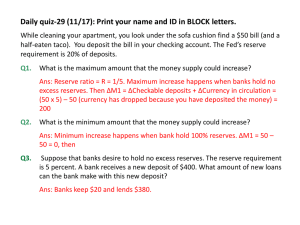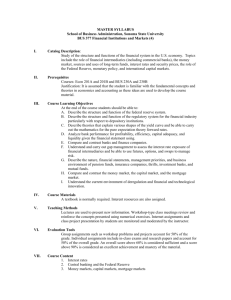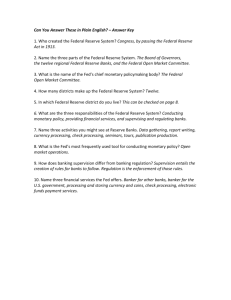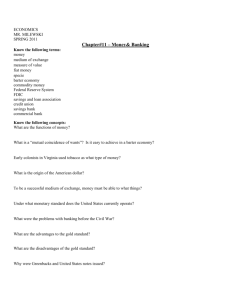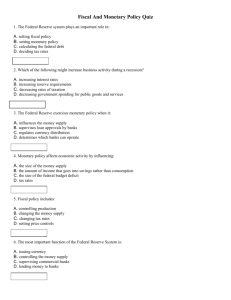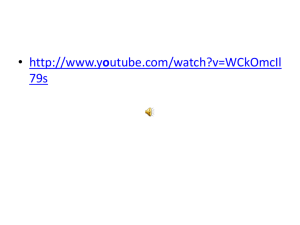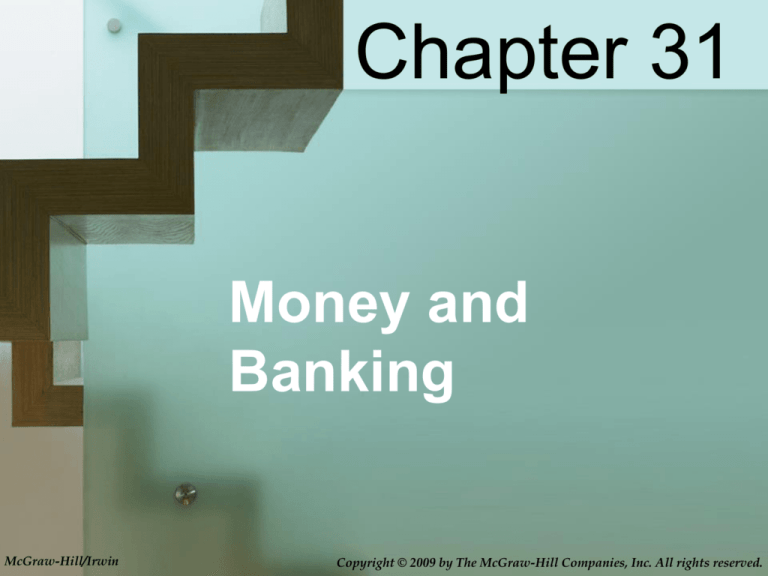
Chapter 31
Money and
Banking
McGraw-Hill/Irwin
Copyright © 2009 by The McGraw-Hill Companies, Inc. All rights reserved.
Chapter Objectives
•
•
•
•
The functions of money
Components of the money supply
What “backs” the money supply
The Federal Reserve and the
U.S. banking system
• The functions and responsibilities
of the Federal Reserve
31-2
Functions of Money
• Medium of exchange
–Used to buy/sell goods
• Unit of account
–Goods valued in dollars
• Store of value
–Hold some wealth in money form
• Money is liquid
31-3
Money Defined
• M1
–Currency
–Checkable deposits
• Institutions offering checkable
deposits
–Commercial banks
–Savings and loan associations
–Mutual savings banks
–Credit unions
31-4
Money Defined
• M2
–M1 plus near-monies
–Savings deposits including money
market deposit accounts (MMDA)
–Small time deposits
–Money market mutual funds
(MMMF – individuals only)
31-5
Money Defined
M1
M2
Currency +
56%
M1
Checkable Deposits +
44%
18%
January 2008
Small Time Deposits +
16%
Money Market Mutual
Funds Held By Individuals +
14%
Savings Deposits,
Including Money Market +
Deposit Accounts
52%
Totals
Source: Federal Reserve System
$1,365
Billion
$7,499
Billion
31-6
Money Supply
• Are credit cards money?
• What “backs” the money supply?
–Nothing!
• Why is money valuable?
–Acceptability
–Legal tender
• FDIC - $250,000 per depositor per bank
–Relative scarcity
31-7
Money and Prices
• Prices affect purchasing power of
money
• Hyperinflation renders money
unacceptable
• Stabilizing money’s purchasing
power
–Intelligent management of the
money supply – monetary policy
–Appropriate fiscal policy
31-8
Anti-Penny:
Pro-Penny
•Worthless
•Waste of taxpayer money
•Waste of Time/Resources
•Rounding may equal out
over time
•Not even making
minimum wage if picked
up
•Many are tossed
aside/thrown away
•Prices may increase to
account for rounding policies
•Regressively punishes the
poor
•Charities
•Nickel costs even more to
produce (7.7₵ each)
•Sentimental Value
•Abraham
Lincoln is
straight
THUG-LIFE.
Federal Reserve System
• Board of Governors
– 7 members, 14 yr terms
• 12 Federal Reserve Banks
–Serve as the central bank
–Quasi-public banks
–Banker’s bank
31-10
Federal Reserve System
Board of Governors
Federal Open Market Committee
12 Federal Reserve Banks
Commercial Banks
Thrift Institutions
(Savings and Loan Associations,
Mutual Savings Banks,
Credit Unions)
The Public
(Households and
Businesses)
31-11
Federal Reserve System
The 12 Federal Reserve Banks
Source: Federal Reserve Bulletin
31-12
Federal Reserve System
• Federal Open Market Committee
– 7 board members, Prez of NY, 4 other
Prez
– Aids Board of Governors in setting
monetary policy
– Conducts open market operations
• Commercial banks and thrifts
–7,300 commercial banks
–11,000 thrifts – mostly credit unions
31-13
Federal Reserve Functions
• Issue currency
• Set reserve requirements
• Lend money to banks
– Lender of last resort
• Set discount rate
• Check collection between regions
– Adjusts reserves accordingly
• Fiscal agent for U.S. government
• Supervise banks
• ***Control the money supply***
31-14
Federal Reserve System
• Federal Reserve independence
–Free of political pressures
• Recent developments
–Relative decline of banks and thrifts
–Consolidation
–Convergence of services provided
by financial institutions
–Globalization of financial markets
–Electronic payments
31-15
Financial Institutions
World’s 12 Largest Financial Institutions, 2007
0
Assets (Billions of U.S. Dollars)
1,300,000
1,600,000
1,900,000
Barclays (UK)
BNP Paribas (France
Citigroup (USA)
HSBC Group (UK)
UBS (Switzerland)
Royal Bank of Scotland (UK)
ING Group (Netherlands)
Mitsubishi UFJ (Japan)
Deutsche Bank Group (Ger)
Bank of America (US)
Allianz Worldwide (Ger)
JPMorgan Chase (USA)
Source: Organization for Economic Cooperation and Development
31-16
U.S. Financial Institutions
•
•
•
•
•
•
•
Commercial banks
Thrifts
Insurance companies
Mutual fund companies
Pension funds
Securities firms
Investment banks
31-17
The Global Greenback
• U.S. currency circulating abroad
– Russia $80 billion
– Argentina $50 billion
– $450 billion total
– 60% of total US currency
•
•
•
•
U.S. profits from dollars leaving
Black markets and illegal activities
Dollar offers stable purchasing power
Exchange rate risk
31-18
Key Terms
•
•
•
•
•
•
•
•
•
•
•
•
•
medium of exchange
unit of account
store of value
M1
Federal Reserve Notes
token money
checkable deposits
commercial banks
thrift institutions
near-monies
M2
savings account
money market deposit
account (MMDA)
• time deposits
• money market mutual
fund (MMMF)
• legal tender
• Federal Reserve
System
• Board of Governors
• Federal Reserve Banks
• Federal Open Market
Committee (FOMC)
• financial services
industry
• electronic payments
31-19
Next Chapter Preview…
Money
Creation
31-20

